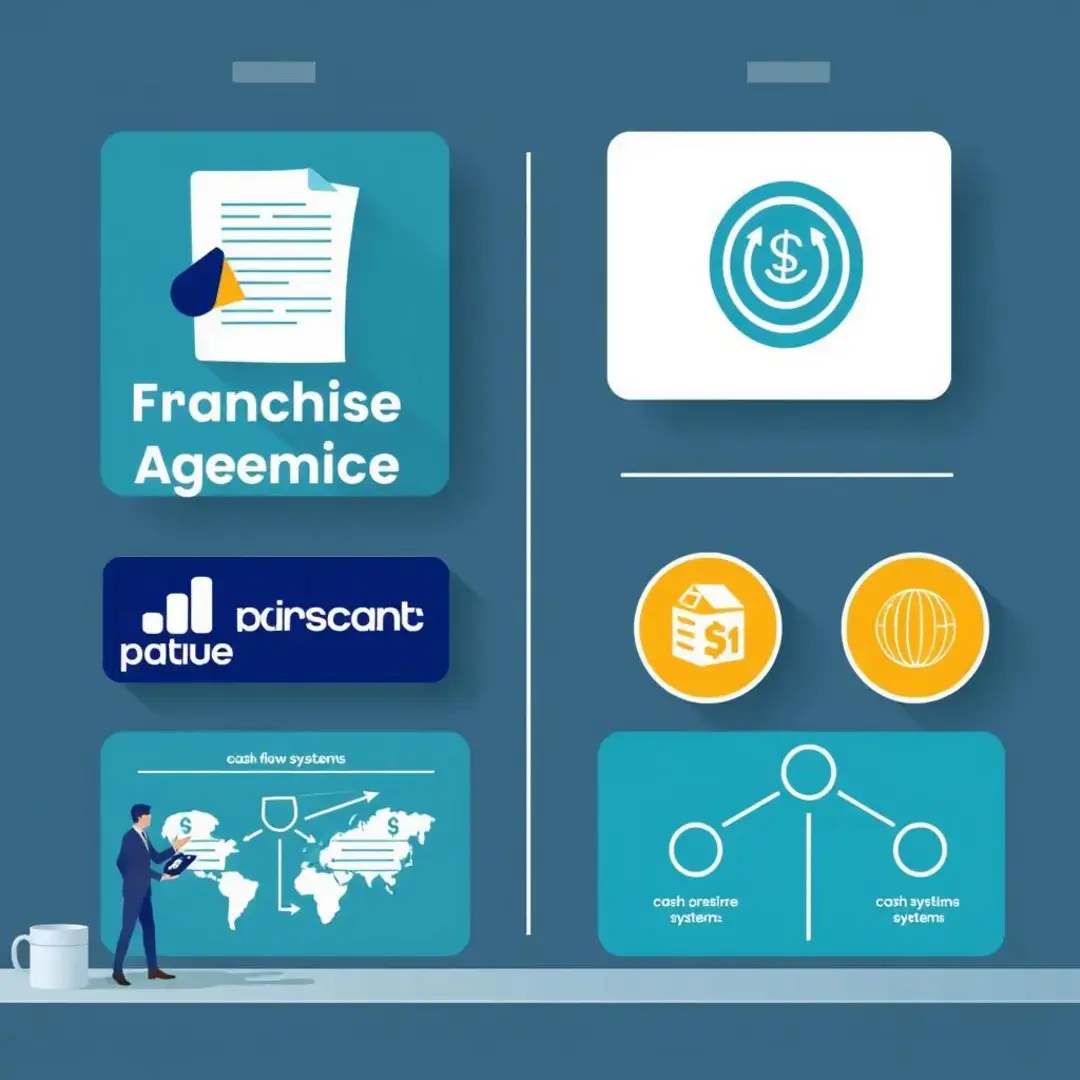Business Model Franchise: What is a Franchise?
Understanding the franchise model

Defining a franchise
A franchise is a business model that allows an individual or business (the franchisee) to operate under the brand name of an established company (the franchisor). This relationship is governed by a legal agreement that outlines the roles and responsibilities of both parties. The franchisee benefits from the notoriety and operational support provided by the franchisor, enabling them to start a business with a proven track record. However, it also means conforming to the standards and procedures set forth by the franchisor.
There are several key characteristics that define a franchise. First and foremost, the franchisor provides the franchisee with a trademark or brand name that must be used in the operation of the business. Additionally, the franchisor supplies a comprehensive business model, which includes marketing strategies, product supply chains, and training programs. This symbiotic relationship results in a strong network where both franchisor and franchisee work towards mutual success, while maintaining the integrity of the brand.
The legal framework surrounding franchising is complex and varies from country to country. In many places, franchise agreements are subject to specific laws designed to protect both parties. For instance, a well-drafted franchise agreement should clearly outline the terms of the relationship, including fees, renewal conditions, and termination rights. Ignoring the legal aspects of franchising can lead to costly disputes, making it crucial for both franchisors and franchisees to understand their legal standing from the outset.
Benefits of the franchise model
Franchising offers numerous benefits for the franchisor. Firstly, it allows for rapid expansion of the brand without the need for heavy capital investment. By leveraging franchisees, franchisors can increase their market presence while maintaining less operational control over individual locations. Moreover, franchising spreads the risk associated with running a business, as franchisees invest their own capital. In essence, franchising can turn a single successful business into a nationwide or even international brand.
For franchisees, the appeal lies in the opportunity to own a business with an established customer base. They gain access to a robust business model that includes training and ongoing operational support. Additionally, franchisees benefit from the power of collective marketing efforts, which would often be cost-prohibitive for an independent business owner. While franchisees are required to adhere to specific guidelines, the level of support can significantly reduce the risks associated with launching a new venture.
Delving deeper into franchise agreements

Key components of a franchise agreement
A franchise agreement typically requires the franchisee to pay an up-front franchise fee, which grants access to the brand and its systems. In addition to this initial fee, franchisees are usually required to pay ongoing royalties, which are typically calculated as a percentage of the franchise’s gross sales. Understanding these financial obligations is essential for any prospective franchisee, as they directly impact the profitability of the venture. Proper financial planning can help franchisees manage these costs effectively while ensuring a sustainable business model.
One of the significant advantages of franchising is the operational support provided by the franchisor. This often includes initial training programs covering various aspects such as marketing, management, and customer service. Additionally, ongoing support can encompass regular updates on best practices and specialized training. A well-structured training program can prove crucial in helping franchisees avoid common pitfalls, smoothing the path to successful business operations.
Many franchise agreements include provisions for territorial rights, ensuring that franchisees have exclusive rights to operate within a specific geographic area. This exclusivity is essential as it protects the franchisee from competition from other franchisees of the same brand in their vicinity. However, these rights may come with limitations, such as performance benchmarks that franchisees must meet to maintain their territorial exclusivity. Understanding these components of the agreement is vital for franchisees to ensure they can operate effectively without undue competition.
Negotiating a franchise agreement
Negotiating a franchise agreement can be a complex process, and it’s crucial for both franchisors and franchisees to fully understand their rights and obligations. Taking the time to thoroughly review the terms of the agreement can prevent misunderstandings that may arise in the future. Franchisees should pay particular attention to clauses relating to fees, renewal rights, and penalties for non-compliance. A clear grasp of these elements can empower franchisees during negotiations, ensuring a fair and beneficial agreement for both parties.
Involving a legal professional when negotiating a franchise agreement is highly recommended. A franchise attorney can provide valuable insights into the nuances of franchise law and help interpret complex legal jargon. This additional layer of expertise can not only protect the franchisee’s interests but also enhance the likelihood of a favorable outcome in negotiations. It is an investment that can yield significant long-term benefits, helping to avert potential legal issues down the line.
Advanced franchise concepts

Multi-unit franchising
Multi-unit franchising refers to the ownership of multiple franchise outlets, offering distinct advantages and challenges. On the one hand, franchisees who own several units can benefit from economies of scale and increased brand visibility, leading to higher overall profits. On the flip side, managing multiple locations can be complex; it requires strong operational and managerial skills. Franchisees must effectively delegate responsibilities and maintain quality across all units to achieve sustained success.
Successful management of multiple franchise locations often hinges on the implementation of effective systems and processes. Utilizing technology for inventory management, staff training, and customer relationship management can streamline operations across various locations. Moreover, maintaining consistent brand messaging and customer service experiences is critical for protecting the franchise’s reputation. Franchisees should consider regular audits and feedback loops to ensure that all locations uphold the brand standards expected by consumers.
International franchising
Expanding a franchise internationally presents unique challenges, particularly regarding legal and cultural differences. Each country comes with its regulations impacting franchising; thus, understanding these rules is vital for successful market entry. Additionally, cultural preferences and consumer behaviors may differ significantly from those in the home country, necessitating careful market research and adaptation of business strategies. Overcoming these obstacles can be daunting but potentially rewarding when approached with due diligence.
Successful international expansion often requires a thoughtful strategy, including partnerships with local affiliates who understand the market landscape. Moreover, it is essential to adapt the brand and offerings to local tastes while preserving core brand values. Conducting thorough market analysis and piloting new locations can reduce the inherent risks of international franchising. By taking measures to understand the intricacies of each new market, franchisors can foster long-term success abroad, tapping into new customer bases and revenue streams.
Analyzing franchise performance

Key performance indicators (KPIs) for franchises
Understanding profitability is crucial for franchisees seeking sustainable growth. Key performance indicators (KPIs), such as revenue per location, operating margin, and return on investment (ROI), serve as vital metrics for assessing business performance. Regularly monitoring these indicators enables franchisees to make informed decisions that enhance financial health. A proactive approach to financial management can ultimately lead to improved profitability and increased confidence among stakeholders.
Beyond financial metrics, measuring customer satisfaction and loyalty is equally important for the long-term success of a franchise. Franchisees can implement surveys, feedback forms, and loyalty programs to gather insights on customer experiences. High customer satisfaction often correlates with repeat business and positive word-of-mouth marketing, which are invaluable for building brand reputation. By actively engaging with customers and responding to feedback, franchisees can cultivate a loyal customer base that drives consistent revenue.
Franchise disclosure document (FDD) analysis
The Franchise Disclosure Document (FDD) serves as a crucial resource for prospective franchisees, providing detailed information about the franchise and its operations. This document covers various aspects, such as franchise history, financial performance, and the obligations of both franchisors and franchisees. Considering the significance of the FDD, careful analysis is essential to ensure that potential franchisees are fully informed before making a commitment. Taking the time to evaluate this document can prevent future misunderstandings and promote a transparent filling of the franchise agreement.
Utilizing the FDD effectively allows prospective franchisees to compare different opportunities and identify potential red flags. By scrutinizing the financials and obligations included in the FDD, franchisees can assess the viability of various franchise options. This thorough evaluation process can reveal insights into the franchisor’s support network, operational needs, and potential profitability. In essence, the FDD empowers franchisees with knowledge, equipping them to make strategic decisions during their franchise journey.
Emerging trends in franchising

Technological advancements in franchising
The rise of e-commerce and digital marketing has transformed the franchising landscape. Today, franchises are leveraging online platforms to connect with consumers more effectively, providing new avenues for brand exposure and sales. Digital marketing strategies, such as social media advertising and email campaigns, enhance customer engagement and allow franchises to reach broader demographics. Staying ahead of technological trends can provide franchisors and franchisees with a competitive edge in increasingly crowded markets.
Technology has also revolutionized franchise management by improving operational efficiency and communication across multiple locations. Franchise management software can streamline processes related to inventory control, staff scheduling, and performance tracking. Additionally, these tools help facilitate better collaboration between franchisors and franchisees, allowing for a more consistent brand experience. As technology continues to evolve, embracing these tools will be essential for franchises aiming to thrive in an ever-changing business environment.
The future of franchising
The future of franchising appears bright, with industry experts predicting continued growth and diversification. As new sectors emerge, there will be additional opportunities across various markets, including health and wellness, sustainable products, and technology services. The adaptability of the franchise model allows it to evolve alongside consumer preferences and economic trends, ensuring its relevance for years to come. Franchisees willing to embrace change and innovation will likely find success in this dynamic environment.
Adapting to shifting consumer demands will be a critical factor for franchises in the future. Increased focus on sustainability, health-conscious products, and personalized customer experiences are already influencing purchasing behaviors. Franchises that proactively respond to these trends will position themselves strategically within the marketplace. By engaging in ongoing research and development, franchisors and franchisees can refine their offerings to meet evolving consumer needs, ensuring a prosperous future in an ever-changing business landscape.












